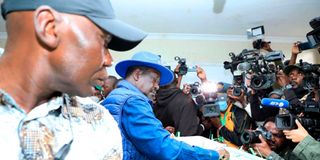Evolving role of the media in elections risky

Journalists covering Azimio La Umoja Party (One Kenya Coalition Party) presidential candidate Raila Odinga casting his ballot during Kenya's general election at Old Kibera polling station in Kibra on August 9, 2022.
Photo |
What you need to know:
- New media can serve as a platform for the dissemination of false or misleading information, lacking the gatekeeping processes and expertise of legacy media.
- The convergence of the traditional and new media as a conduit of information dissemination has raised questions on regulation and censorship.
- The media must be impartial and balanced in their election news coverage and should not present programmes or articles that favour a particular candidate or political party.
Undoubtedly, the media has garnered a greater role in determining political agenda, setting issues of public interest, obligating political parties and candidates to follow the agenda and, in many cases, against their interests.
The media has developed to be a great power within any electoral process.
Media technology has come to be an important issue in electoral processes. The growth of the internet has garnered huge significance during the past few years, especially in its role of informing voters about electoral issues.
Free media have long been recognised as a cornerstone of democracy and play a significant role in influencing political discourse during the electioneering process.
Especially when free and balanced, traditional media adopt transparency and the dissemination of vital electoral information.
The upsurge of new media such as social media sites and blogs offers further avenues and possibilities for participatory citizenship, information and knowledge sharing, as well as inclusion and empowerment.
Equally, legacy and also new media can play a vital watchdog role and serve as a political campaign platform and forum for public debate.
With the Digital Era and increasing access to the internet, candidates and citizens in the developing world are turning to new media to interact with their preferred candidates and give feedback.
At its best, the new media exemplify the spirit of democracy.
Misleading information
But new media can serve as a platform for the dissemination of false or misleading information, lacking the gatekeeping processes and expertise of legacy media.
The convergence of the traditional and new media as a conduit of information dissemination has raised questions on regulation and censorship and, relatedly, how to protect freedom of expression and press freedom while safeguarding against inflammatory speech.
And despite the dramatic expansion of new media and technology worldwide, there still are multiple groups, such as the elderly, illiterate and poor, with limited or no access to these resources.
Nevertheless, new media have increasingly become a primary constituent of the media landscape and a vital outlet for candidates, political parties, election management bodies and citizens.
Citizens have not only more avenues to get to their candidates and campaigns, than ever before, but also present new opportunities and challenges for promoting democracy and new possibilities for democratic consolidation via the internet.
The main elements that integrate an election should be communicated by governmental media, which basically includes information on political parties and candidates, questions of debate, the voting process and any other elements that encourage a friendly process for voters.
The media must be impartial and balanced in their election news coverage and should not present programmes or articles that favour a particular candidate or political party.
Governmental media should educate voters on the general and particular issues of the election.
Mr Kitema is a communications and public relations specialist. [email protected].





